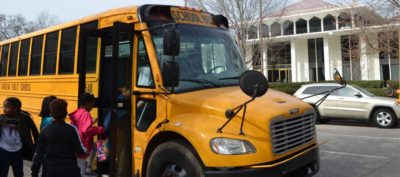

In looking ahead to North Carolina’s great education debate over the second half of 2020, the image of a five-point intersection comes to mind. From multiple directions, potent forces, issues, and trends seem headed for a convergence — or perhaps a collision.
North Carolina has yet to feel the full force of looming big decisions resulting from the COVID-19 pandemic, the subsequent economic recession, and the racial justice movement. Cross-cutting through the intersection are the 2020 elections for president, Congress, governor, and state legislature.
The elections will hinge more on voters’ decision-making in the context of the pandemic, the economy, and racial attitudes than on specific education issues. Still, the outcome of the elections will profoundly shape the political and policy landscape for schools, colleges, and universities.
An overarching question is whether attitudes shaped by the pandemic and rising awareness of systemic racism will create an impetus toward rebuilding public institutions and toward seeding common ground. Or will the election build upon and intensify hyper-polarization?
Recent soundings of public opinion suggest that the crises have opened up attitudinal space for the possibility of forging a coalition that includes many white people freshly ready to address racial inequities and injustice. In an essay examining public opinion in the aftermath of recent police killings of Black people, William A. Galston, a senior fellow at The Brookings Institution, reports that “76% of Americans now say that discrimination against racial and ethnic minorities in the United States is a ‘big problem,’ including 57% of conservatives, 71% of whites, and 69% of whites without college degrees.”
“It’s not 1968 anymore,” Galston writes. “A large share of white Americans now endorse views on race relations once confined largely to African Americans. While Americans of all parties and races continue to oppose violent protests, appeals to ‘law and order’ not balanced with the recognition of deep injustice lack the resonance of half a century ago.”
In a recent survey of Southerners, the E Pluribus Unum Initiative, headed by former New Orleans Mayor Mitch Landrieu, offered a hopeful yet nuanced assessment. The findings, which focused largely on COVID-19 in the South, resulted from questions posed to 600 white respondents, 600 Black respondents and 600 Latino respondents.
“There remain clear racial divides in opinion regarding the causes of socio-economic disparities in America,” says the Unum report. It goes on to observe that “there has been striking movement among white Southerners’ views since our survey 8 months ago. A majority of white respondents, 51 percent, now attribute poverty to a lack of opportunity rather than poor life choices.”
In North Carolina, the first crucial movement toward the imaginary five points comes next week, when Gov. Roy Cooper announces which of three options the state will pursue to re-open pre-K-12 schools. Surveys of parents, teachers, and school staffs have indicated divided opinion and considerable concern over returning to in-school instruction while the contagious virus continues to spread. Early studies of online instruction have illuminated educational disparities along lines of race, ethnicity, and household income.
Resuming schooling is complex and costly. So far this year, the state has filled gaps and marked time, buffered by federal crisis assistance. But not too far down a road looms great uncertainty over revenue. How much will the recession drain from state and local governments? How much, if anything, will the federal government provide, as it should, in another round of stimulus?
Meanwhile, headed toward the education policy intersection is the proposed first-year action plan to carry out Judge David Lee’s order in the Leandro education equity case. Even at an estimated $427 million — half for teacher pay raises — it’s a rather modest package of support for low-performing schools and early childhood programs, as well as revising the schools funding formula.
How to resume public education is fraught enough for now; it will test the public leadership and management skills of the governor on down to school boards, superintendents, and principals. The great education debate will persist, although no other sweeping education decisions are likely in 2020 — except, of course, at the ballot box where mind-changing in the electorate could generate momentum for advancing public education in 2021.


